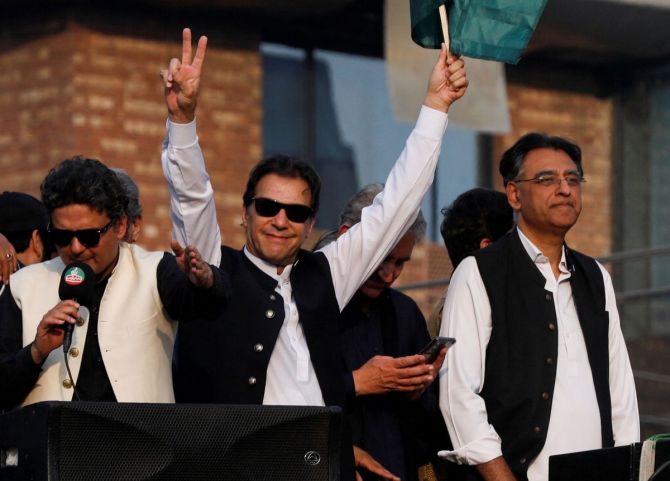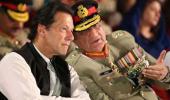'Will Imran compromise with the army? We are all human beings. We all compromise.'

The Pakistan Muslim League (Nawaz) party led by former prime minister Nawaz Sharif and former Pakistan president Asif Ali Zardari's Pakistan People's Party is all set to form a coalition government under the patronage of its army.
While Imran Khan's Pakistan Tehreek-e-Insaf emerged as the single largest party with 95 seats in Pakistan's national assembly, the PML (Nawaz) won 78 and the PPP won 54 seats respectively in the 265-strong national assembly.
With the next coalition government in Pakistan a mere formality now, how will the PTI react? Will Imran Khan cut a deal with the army? Will the army entertain a deal with Khan who challenged its supremacy in Pakistan's politics and existence?
Former Intelligence Bureau officer Avinash Mohananey, who spent considerable time in Pakistan on security assignments, does not rule out this possibility in the concluding part of this interview with Prasanna D Zore/Rediff.com.
"If he is not given a role, there will be other complications that will arise," foresees Avinash Mohananey.
What will be the main challenges before the PML-N and PPP government if and when this government takes concrete shape?
Right now there are two major challenges that Pakistan faces. The biggest two challenges revolves around its economy -- spiraling inflation, shortage of essential items, precarious balance of payments situation -- and its internal security.
It has to restructure IMF loans. We all know what kind of conditions IMF imposes (on the borrower nations).
You (the IMF will ask Pakistan to) increase the electricity rate, you increase the gas rates, you increase the petrol rates, and you reduce the subsidies. Do anything but bring fiscal deficit under control.
They will also ask to liberalise imports and exports.
While Pakistan is somehow managing all these contradictions till now, nobody knows how things will turn once the IMF steps in and enforces its 'fiscally-prudent' conditions.
The burden of all the price hikes will have to ultimately borne by the masses. The army or the elite political class is not going to shoulder this burden.
The problem will be for the masses. Then who is going to handle it? The wrath of the people will have to be handled by these people (those in the next government and the Pakistan army).
But the army will point fingers only at the civilian leadership. The army will always play it safe and blame it all on the civilians.

What is Imran Khan's future? Do you think he could strike a deal with the Pakistan army in the days ahead to wiggle out of prison and play his part in the charade that is Pakistani democracy?
If he can win 95 or so seats in the national assembly (despite being in jail) and hold the key to the formation of a government in Khyber Pakhtunkhwa province, then the Pakistani establishment just can't ignore him at all.
Given this political prominence, he may have a role to play. And if he is not given a role, there will be other complications that will be arising.
About his future, if the army has its say, it would keep him behind the bars for as long as possible. He crossed that red line of the Army on May 9 last year when the vandalisation took place.
If the army could dismiss one of its lieutenant generals and two major generals, besides other junior officers for the May 9 violence (when Imran Khan's supporters in an unprecedented attack targeted military installations including the army headquarters in Rawalpindi after his arrest), there is no way it will spare the civilian set-up or civilians who were involved in the violence.
Many of them are being tried by the military courts. So those verdicts are going to come. There are many triggers that are waiting.
For the army right now, Imran is just a no-go.
Will he compromise with the army?
We are all human beings. We all compromise.
So it depends at what stage he agrees to a compromise. Whether he compromises, or does something which is acceptable to the army, or cuts a deal with the army, that possibility always remains.

Given that both Nawaz Sharif and Asif Ali Zardari are businessmen at heart and they have huge business interests in Pakistan, do you see any scope of improvement of relations between India and Pakistan under their leadership?
Right now, my feeling is different from those analysts who write on Pakistan.
I think on India, the Pakistan army and the civilian leadership will be on the same page. They would like to relax the relationship. I would not say normalise the relationship, that's still far away. But relaxation in the relationship is required from the Pakistan side; more from the Pakistan side because they can control this food inflation, if they allow imports of food and foodgrains from India.
Again, for them, the continued animosity (against India) is causing more problems for their army with the kind of the internal security situation Pakistan faces today.
Obviously, the internal security situation in Pakistan requires deployment of the army in Khyber Pakhtunkhwa, Balochistan and those areas where the Tehreek-e-Taliban Pakistan, the Islamic State Khorasan-Province and the Baloch separatists are operating. It's a very serious threat to their internal security.
In this kind of situation where their economy is down, and they are facing a massive challenge on the internal security front, it may not be possible for the army to pick up a confrontation on its eastern border.










